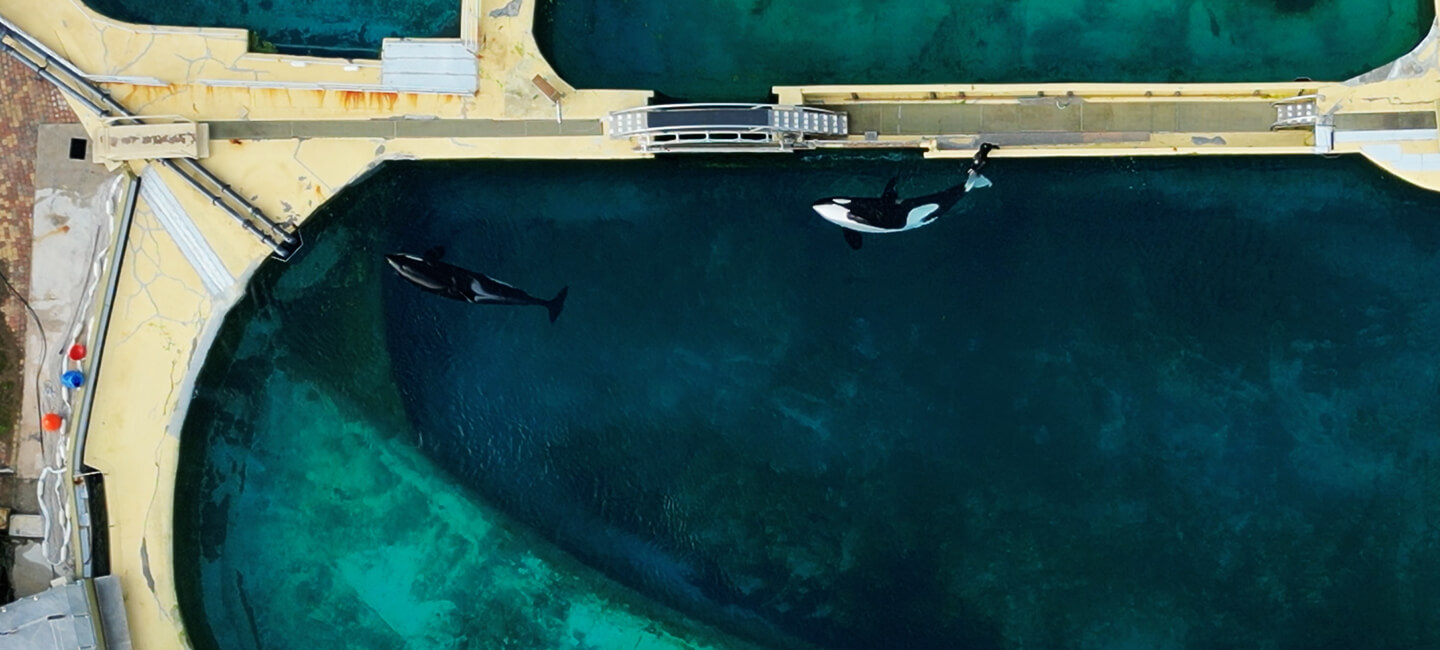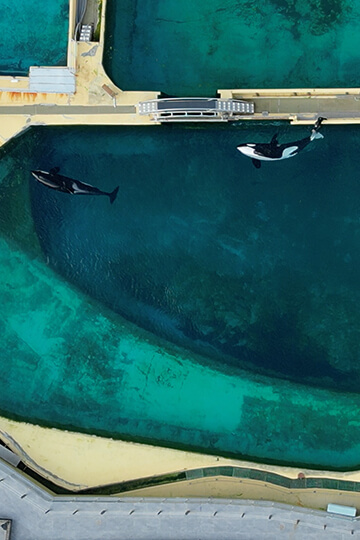

Forensic report on orcas: 84 pages of platitudes despite dysfunctions at Marineland
Two meetings in fifteen months, six months’ delay by Marineland before sending the documents and dozens of emails exchanged between the parties, including endless reminders to the experts. In the midst of the proceedings, the park did not see fit to inform them of Inouk’s death so that they could take part in his autopsy. They heard it from the press. They have chosen to remain silent since June 2024, and have not even deigned to send a summary sheet so that the main points can be discussed before the final report is delivered, thus preventing any upstream fine-tuning as is customary. A lack of courage that is clearly a missed opportunity, and at the limits of the rules of the exercise.
The expert report ordered by the Grasse court at One Voice’s request was delivered on April 7, 2025. We confronted Marineland about the quality of the water and the state of the tanks, but above all about the health of Inouk and Moana, then Wikie and Keijo.
Today, we are releasing this report to the general public, along with our analysis of it.
While certain undeniable elements are highlighted (such as Moana’s illnesses, or Inouk’s dental problems), the reasons for the development of this condition are never questioned, even though this was precisely the role of this procedure.
The cetacean specialists One Voice asked to take part in the expert report, Dr. P. Gallego and Dr. D. Perpiñan, as well as our three lawyers, Mses C. Lanty, C. Robert and M. Voutsas, are today joining us in denouncing the catastrophic orca management practices at Antibes Marineland, revealing that our concerns were well-founded… if it were still necessary to demonstrate this, since our request for an expert report alerted to the health of Moana and Inouk, one of whom died two weeks and the other six months after the court’s decision to order it.
We therefore deplore the lack of hindsight and critical eye of the two experts appointed by the court with regard to the elements transmitted – with bad grace – by Marineland.
Here’s our analysis:
- Obvious errors in medical records
Admittedly, the word “orca” is a feminine noun in French, and Moana ends with the letter a, but we were entitled to expect better: the expert report reveals that, in Moana’s file, the court’s experts made a mistake in the sex of the orca – presented as female when he was a male – revealing their disturbing lack of knowledge of the file. - Prolonged and inadequate treatment
Medical records show that Moana, who was monitored from January 5, 2023 until his death on October 18, 2023 (i.e. 292 days), was subjected to heavy and repeated treatment:- antibiotics for 107 days (37% of the period);
- corticoids for 31 days (11%);
- painkillers for 36 days (12%);
- antifungals for 21 days (7%).
These treatments, combined with invasive and painful dental procedures, among other things, show that veterinary care is far from sufficient to prevent irreversible deterioration in the animal’s state of health.
Dr. Pierre Gallégo, One Voice’s veterinary consultant and a cetacean specialist, explains:
“Some major dental procedures were carried out over extremely long periods. For example, the drilling of one of Moana’s teeth began before January 5, 2023, and was completed on January 31, 2023. This was followed by post-drilling care (curettage of the pus in the drilled canal), which lasted until the day before his death on October 18, 2023. He therefore suffered from severe dental infections over a long period of time (a minimum of 292 days), requiring heavy, repeated and prolonged treatment with antibiotics and painkillers, extensive and painful dental surgeries, with infected periodontal pockets requiring rinsing to remove the pus. It’s very clear that Moana suffered from severe dental pain for a very long time, right up to his death. Who can believe for a moment that the orca was well and that One Voice’s fears were unjustified? As for the management of orcas by Antibes Marineland, it is quite simply catastrophic.”
- Critical diagnostic omissions
The report also points out that pathologies such as pneumonia, ulcerative gastritis and the presence of foreign bodies in Moana’s and Inouk’s bodies – diagnosed a posteriori at autopsy – were never adequately treated by Marineland’s veterinarian, whose priority was repetitive dental operations. This lack of investigation contributed to leaving pain unrelieved and aggravating the orcas’ suffering, to the point of no return. Inouk suffered from osteomyelitis of the jaw, an inflammation and destruction of the bones caused by bacteria, mycobacteria or fungi. A serious, excruciating, chronic infection, not properly treated, which means that Inouk suffered for a very long time.
Suffering attributed to an unsuitable environment
- Consequences of stereotypical behavior
The analysis establishes that the dental wear responsible for severe lesions in Moana and Inouk is the result of stereotypical behavior induced by boredom and suffering in captivity. Lack of behavioral enrichment and too-small tanks would have led them to bite metal walls and structures, thus favoring the appearance of chronic and severe suffering. - Problems observed in several orcas
The cases of Wikie and Keijo, although deemed “normal” on the basis of the documents provided by Marineland, contrast with the damning findings on Moana and Inouk. Numerous signs, such as widespread dental erosion, dorsal fin deformities (present in 100% of adult males in captivity) and abnormal social withdrawal behaviors, testify to latent malaise and inadequate care.
Blatant inconsistencies concerning the park’s infrastructure
- Contradiction between official declarations and reality
All these years, in response to our warnings, the park and the Ministry said that all was well in the best of worlds…
While the experts’ report states that the infrastructures (tanks and water circulation system) comply with minimum sanitary standards, the fact that Antibes Marineland and the French Minister for Ecology, Agnès Pannier-Runacher, are demanding, now that the park is closed, that the orcas be urgently transported – on the pretext of an advanced state of deterioration – raises questions. The absence of any explanation for this urgency, despite reports of “recurrent repair work”, suggests that the reality in the field is far more worrying than the experts suggest. Where is the reality? We’ll probably never know, given the experts’ unwillingness to take a stand and really objectify the situation. - Lack of transparency in the documentation
The court’s ruling (Aix Court of Appeal, September 2023) provided for the submission of a summary document. However, this document was not produced, and the late or erratic transmission of Marineland’s documents bears witness to a lack of procedural rigor. This dysfunction contributes to the impression of an “expert report” which was mistaken for a simple report, without any critical investigation of the facts.
In conclusion:
An urgent call for the overhaul of management and practices
All the elements contained in the expert documents demonstrate that the management of orcas at Antibes Marineland is marked by an accumulation of diagnostic errors, inadequate medical follow-ups and infrastructure management out of step with the animals’ real needs. The report concludes that these dysfunctions – responsible for considerable suffering and even early deaths – illustrate a serious attack on animal welfare.
In light of these findings, One Voice is calling for an urgent overhaul of the orcas’ day-to-day management, including:
- A complete review of medical follow-up protocols and veterinary practices;
- Questioning captivity conditions and appropriate behavioral enrichment;
- Total transparency in the communication of files and interventions carried out;
- The association reiterates its proposal made to the Ministry and Marineland the day after Moana’s death in October 2023, and repeated on the day of Inouk’s death a few months later, to fully fund the mission of veterinarians and scientists specializing in orcas to come and take care of them and give Wikie and Keijo a chance of not suffering the same tragic fate as the other members of their family.